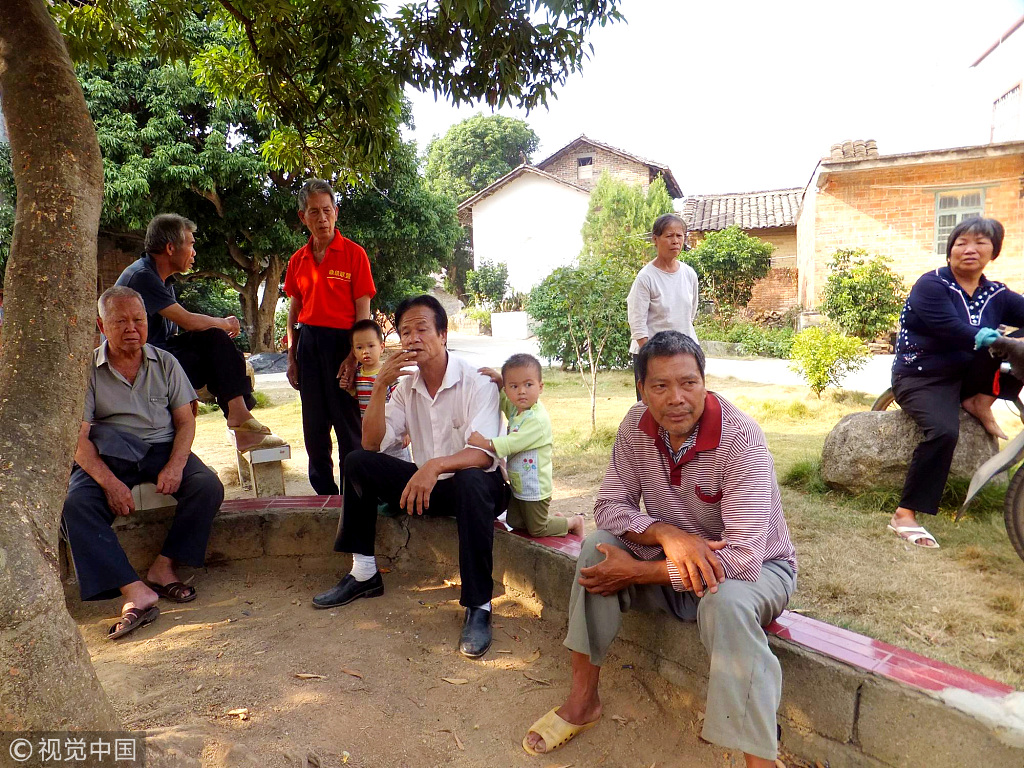Gambling, scams and porn blight rural lives
- By Wu Jin
 0 Comment(s)
0 Comment(s) Print
Print E-mail China.org.cn, February 15, 2019
E-mail China.org.cn, February 15, 2019
The seven-day Spring Festival holidays beginning on Feb. 4, may be far from enough for a family reunion in China's impoverished rural areas. Once the major family labor force bid goodbye to their parents, children and even spouses to look for higher-paid jobs in bigger cities, there are 51 weeks looming ahead if not more in terms of separation.

Although the massive migrant flows from poor, outlying and landlocked areas to cities have been nothing new in China's dramatic transformation over the past 40 years, the sufferings as a sequence of rural families' separation have become ever more pronounced.
In a child's diary, the lives for left-behind seniors in his family in rural Guizhou province are poignant and highlight a lack of dignity. "Since my parents headed to Shenzhen (Guangdong province), the family has been in a mess. In rooms lie piled-up tools, dirty clothes and dogeared books; in the refrigerator, the meals turned moldy and, in the kitchen, a dead mouse had nobody to remove it from the bottom of the closet."
The diary gives a glimpse to the country's rural life where left-behind seniors and juniors both have to put up with overwhelming loneliness, poverty and ignorance.
Meanwhile, without appropriate guidance, connection to the internet, an important component to facilitate lives in rural areas, has opened up easy access to gambling and pornography for locals.
According to Banyuetan, a Chinese biweekly magazine, a 72-year-old man was spotted lying on a heated brick bed, listening to a program rife with erotic lines from his cellphone. Not far away, sat a five-year-old child concentrating on his own cellphone. With few home appliances, the stark rooms are filled with the flickering light of the WiFi router, costing hundreds of yuan a year, which, according to the old man, is affordable and worth the price.
Moreover, swindlers in the guise of religious gurus are promising to end the dull lives for locals; however, their true purposes targets only money and sex.
With no highbrow culture available, villagers left behind are addicted to gambling. Even though the stakes are meager, usually one (US$0.15) to two yuan each, the entertainment is illegal in the Chinese mainland.
The left-behind impasse is not prevalent in underdeveloped villages only. In Zhejiang province, one of the most affluent provinces in China in GDP terms, most of the more than five million seniors in suburban areas live lonely, 83,000 children are growing up without parental care and a substantial number of women are forced to live separately from their husbands year after year.
According to Zhao Guoqiu, director general of the Zhejiang Association for Mental Health (ZJMH), because of the farming drudgery and overwhelming loneliness, rural left-behind residents are prone to mental problems.
Among his patients, he still remembers an old woman who divorced and brought up a 10-year-old granddaughter to live in rural Wenzhou, Zhejiang province. In addition to housework, she still had to toil in the fields. The work overload and an empty house depressed her.
"She cooperated well when her son sent her to hospital and was willing to take medicines on time," Zhao recalled. "However, when she returned home, without taking medicines as required, she relapsed into depression and ended her life by hanging herself."
"It is traumatic for one to feel being knocked out, peripheralized or abandoned," Zhao explained, saying the left-behind phenomenon should attract far more social concern.
At 40, a rural woman from Maoshe Village, Huangyan, Zhejiang province, complained that the exodus of the male labor force has left her having to care for two elderly people and two children, not to mention the heavy workload in the fields. She calls herself "a working machine", with no helping hands, no concern by society and even no one to chat with when she feels low.
The psychological problems with the left-behind children are also pressing. In a primary school, in Taizhou, Zhejiang province, 82 percent left-behind young respondents said they feel lonely and 45 percent pupils don't know who they can turn to when they get into trouble.
In some secondary schools in Guizhou and Sichuan provinces, teachers sometimes outnumber parents when parents' meetings are held. A voluntary teacher who wished to speak with anonymity said some students, incapable of controlling themselves, watch videos in classes or at bedtime; what is worse, they visit pornographic websites.
Each weekend, there are parents sending food to students. However, together with the food are self-made cigarettes. What's more, when students get remittances from their parents, they usually spend the money on buying new cellphones and inviting classmates to eat at restaurants after which they play video games at internet bars. Without parents in regular contact, the teachers can find nobody to help discipline those children.
Lacking proper education for a correct outlook in life, left-behind children are more likely to treat money as the ultimate goal in life. Baqierihuo, a scholar from the Yi ethnic group, recalled, the drug trade used to be rampant in Daliangshan, Sichuan province.
While fighting with the illegal businesses, the local police arrested a young female drug dealer. But instead of feeling ashamed, she sneered at the police and challenged them by asking how much they earn each month.
"Morality has greatly fallen short of the wealth that the country has amassed during the past four decades," the ethnic scholar pointed out.
Chen Liqun, a retired educator and also a voluntary headmaster in schools of the less developed western region of China, suggested the country should resort to the traditional countryside virtues to empower rural residents and revive their hometowns.






Go to Forum >>0 Comment(s)